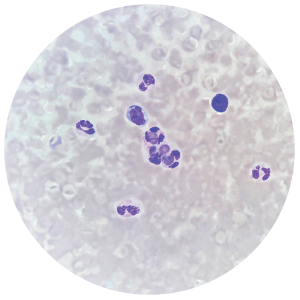
Lupus erythematosus cells on 100X light microscope stain.
Sunisa Butphet / shutterstock.com
SAN FRANCISCO—The 13th International Congress on Systemic Lupus Erythematosus (SLE), held April 5–8, highlighted continuing advances in the fight against lupus, a chronic, inflammatory, autoimmune disease affecting multiple organ systems.
The rheumatologist’s ability to control this incurable and life-threatening condition is limited both by its heterogeneous presentation and by the lack of successful treatment options, with only one drug, belimumab, approved for lupus treatment in recent years. “But we are getting better in the science of how to study the drugs that might make a difference,” said Ronald van Vollenhoven, MD, PhD, professor of rheumatology and head of the Clinical Immunology and Rheumatology Department at the Academic Medical Center of Amsterdam University in The Netherlands.
“Part of that is learning how to do clinical trials that can produce clear results. Our methods of testing are getting better, although there’s still a long way to go,” Dr. van Vollenhoven said. He co-facilitated a plenary session at the Congress, highlighting six important clinical trials of treatments for lupus. “Some of the studies were successful, some were not successful in terms of their primary endpoints. But all presented interesting data,” he said.
Dr. van Vollenhoven, who predicts U.S. Food and Drug Administration approval for several new lupus drugs is likely within the next few years, shared his own research on ustekinumab, an immunosuppressive treatment already used for severe plaque psoriasis, psoriatic arthritis and Crohn’s disease.
“That’s a great story,” he told The Rheumatologist. “A group of scientists took a look at 14 biologics approved in recent years for different rheumatic conditions. They analyzed, using a sophisticated algorithm, their potential as treatments for lupus.” At the top of the list was ustekinumab, a monoclonal antibody that targets interleukin 12 and 23. This would be a novel mechanism of treating lupus, but both of these cytokines have already been implicated in the pathogenesis of lupus. The researchers then approached its manufacturer, Janssen Biotech—which at first was reluctant but eventually agreed—to fund a phase 2 study in recognition of the importance for finding new drugs to treat lupus.

Dr. van Vollenhoven
Dr. van Vollenhoven’s trial found the Systemic Lupus Erythematosus Responder Index (SRI(4)) response was significantly greater in the ustekinumab group than
in the placebo group (62% vs. 33%), demonstrating sustained clinical benefit to global and organ-specific SLE disease activity—including greater joint and skin improvement.1
Patients who crossed over from the placebo to the test group also showed clinical improvement. A phase 3 trial of ustekinumab for treating lupus is now underway, recruiting patients at centers in a number of countries, Dr. van Vollenhoven told attendees. “We hope to complete enrollment by October for a full-year study of the treatment,” he said.

